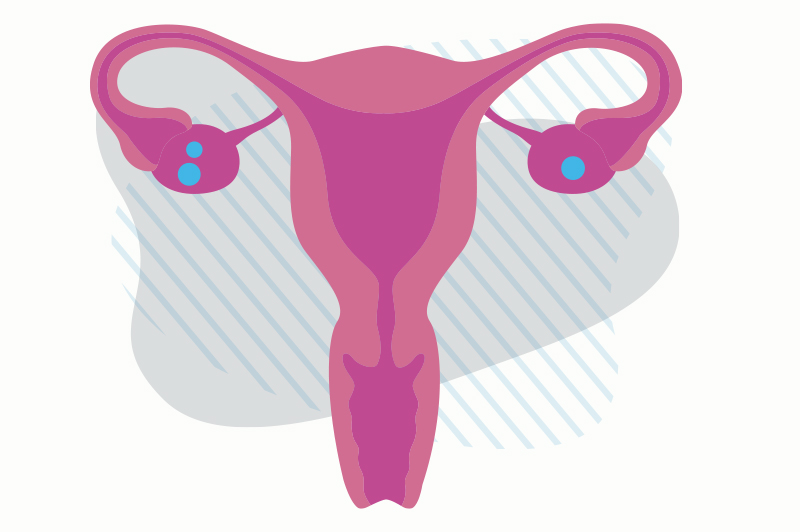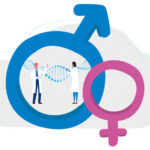New genetic insights could change how we treat, and talk about, polycystic ovary syndrome

Polycystic ovary syndrome (PCOS) has long been viewed as a hormonal disorder affecting women of reproductive age. However, ongoing research led by Jia Zhu, MD, attending physician in the Division of Endocrinology, and her colleagues is changing that. Their most recent findings indicate that PCOS is part of a broader metabolic and reproductive disorder that affects both men and women — and that manifestations of genetic risk factors for PCOS can be detected as early as childhood.
The metabolic impact of PCOS
Existing research has shown that both male and female children of women with PCOS can exhibit signs of cardiometabolic dysfunction, such as a higher risk of obesity, insulin resistance, and dyslipidemia, starting in childhood. These findings suggest that the genetics of PCOS extend beyond reproductive health, affecting overall metabolic function in both sexes throughout life.
In a previous study, Zhu and her colleagues built on this body of work, using a polygenic risk score (PRS) to explore the genetic basis of PCOS more deeply. They discovered that a higher PRS was associated not only with an increased risk of PCOS in women, but also with obesity, type 2 diabetes, and coronary artery disease, as well as androgenic alopecia (male pattern baldness) in men, further underscoring the underlying condition’s broad metabolic health impact.
In their most recent study, Zhu and her colleagues used the PRS for PCOS to identify metabolic, growth, and developmental manifestations of this underlying disorder in childhood and adolescence. After analyzing data from four large pediatric cohorts, they found that polygenic risk for PCOS is associated with higher body mass index and increased fat mass, as well as peak height velocity changes in both boys and girls.
Notably, many of these changes can appear in children as early as 6 years old, well before the typical age of puberty. This suggests that genetic risk factors for PCOS affect these traits independent of active ovarian function.
“[Our findings] confirm that genetic risk for PCOS manifests in detectable ways in both boys and girls, starting from middle childhood,” Zhu explains. “Using genetics, we can see if people have risk factors for the condition even before they reach reproductive age.”
Preventive strategies and a possible new name
This research marks a fundamental shift in how clinicians understand and address PCOS, with implications for clinical practice, patient care, and even the condition’s name. By recognizing PCOS as a lifelong, systemic metabolic condition, endocrinologists can start to shift from reactive treatment strategies to proactive, preventive approaches.
Zhu explains the practical impact of her team’s research: “We hope to one day translate these findings into clinical tools to predict risk and offer targeted counseling for children who are at risk of developing PCOS and PCOS-related health conditions in later life.” Early genetic identification and risk assessment enable clinicians to implement personalized, preventive strategies well before complications develop.
Specifically, Zhu proposes that these preventive measures might include closely monitoring weight and growth, earlier and more frequent screening for insulin resistance, implementation of dietary interventions, and encouraging increased physical activity from an early age. “There are a lot of lifestyle-specific factors that can be made to modify genetic risk,” she explains.
Ultimately, these findings from Zhu and team suggest a future in which PCOS becomes a preventable condition, rather than an inevitable genetic destiny.
The future of PCOS research
Zhu and her colleagues continue to explore how genetic factors associated with PCOS can influence child health. Currently, they’re investigating how maternal genetic risk for PCOS and the maternal-fetal environment affect a child’s likelihood of adverse birth and childhood outcomes.
“Part of [PCOS risk] is direct genetics passed from mother to child. If a mom has PCOS, her child will inherit roughly 50% of her risk factors. But the other part is the maternal-fetal environment,” Zhu explains. “Women with PCOS are at a higher risk for pregnancy complications such as gestational diabetes and preeclampsia. Their intrauterine environment puts their child at a higher risk for having adverse birth outcomes that can also lead to metabolic problems in later life.”
Zhu and her team are analyzing population-based biobanks with mother-child pairs to better understand how these genetic and environmental influences interact. Their findings have the potential to open a window for risk assessment and intervention even before birth.
“In the future, this could allow clinicians to do genetic testing when a woman with PCOS, or at high risk for it, is pregnant or considering pregnancy, allowing clinicians to potentially tailor counseling for her prenatal care that can ultimately affect her offspring’s metabolic health.”
Learn more about the Division of Endocrinology at Boston Children’s Hospital
Related Posts :
-

Genetic risk factors for PCOS act independently of ovarian function
It’s estimated that as many as 10 percent of women have polycystic ovary syndrome (PCOS), a hormonal condition that ...
-

Out of balance: How hormones can affect your child’s period
If your tween or teen is experiencing irregular periods, they aren’t alone. In the first two years after getting ...
-

Can we harness intestinal cells to treat endocrine disorders?
Enteroendocrine cells punch above their weight. Comprising just about 1 percent of intestinal cells, they produce, as a group, around 15 different ...
-

A better treatment for endometriosis could lie in migraine medications
Endometriosis is a common, mysterious, often painful condition in which tissue similar to the uterine lining grows outside the uterus, ...





